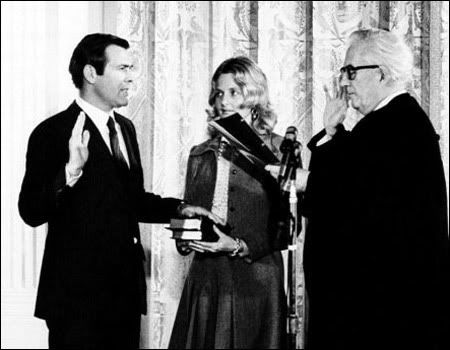|
Thank You For The Dose, Snugs.
Posted on 01/01/2007 5:18:02 PM PST by snugs
Oh no 2006 was a bad year for her prayers that 2007 does not start out the same way.
Prayers for your mom and your family, MamaB!
I know......
what a devoted poster!!!!
Thanks, sweet you. She'll be most appreciative.
|
oh my gosh!!! 102!!! Just think of all the changes that have happened in her life time!!!
Howdy and Happy New Year!
Isn't that amazing?
I liked the second one where Rummy and his wife were looking at one another.
They're so cute together!
I MISS RUMMY!


Mr. and Mrs. Hottie
Prayers sent for MamaB's mom.
snugs:
You're a 'workaholic' and I thank you for it!!!
IT'S ALL (PRESIDENT) BUSH'S FAULT . . .
A PROUD DAY FOR U.S. AND A LESSON FOR TYRANTS
By Ralph Peters
[Ignore Ralph's obligatory swipes at "the Bush Administration's conduct of the Iraqi conflict" and focus on what he admits the President did right -- actually the President did MOST of it right but the MSM/rightwing pundits will NEVER admit it!!]
Hussein is dead. The mighty dictator met a criminal's end on the gallows. The murderer responsible for 1 1/2 million corpses is just a bag of bones.
For decades, the world pandered to his fantasies, overlooking his brutality in return for strategic advantages or naked profit. Diplomats, including our own, courted him, while the world's democracies and their competitors vied to sell him arms.
Saddam always bluffed - even, fatally, about weapons of mass destruction - but the world declined to call him on his excesses. Massacres went unpunished. His invasions of neighboring states failed to draw serious punishment. He never faced personal consequences until our troops reached Baghdad (a dozen years late).
As long as Saddam paid sufficient bribes and granted the right concessions to the well-connected, the world shut its eyes to his cavalcade of atrocities. Even when his soldiers raped Kuwait, the United Nations barely summoned the will to expel his military - and the alliance led by the United States declined to liberate Iraq itself from a tyrant with a sea of blood on his hands.
Everything changed in 2003. For all of its later errors in Iraq, the Bush administration altered the course of history for the better.
It may be hard to discern the deeper meaning of our march to Baghdad amid the chaos afflicting Iraq today, but President Bush got a great thing right: He recognized that the age of dictators was ending, that the era of the popular will had arrived. He and his advisers may have underestimated the difficulties involved and misread the nature of that popular will, but they put us back on the moral side of history.
You can read the rest of this commentary at
http://www.nypost.com/seven/12302006/news/columnists/a_proud_day_for_u_s__and_a_lesson_for_tyrants_columnists_ralph_peters.htm
AN OVERLOOKED LEGACY?
By Captains Quarters
The Washington Post notes an overlooked part of the George Bush presidency, one that gets almost no attention despite the constant focus on the region. Under Bush, the US has tripled aid to Africa, with even more increases proposed for the next two years:
"President Bush's legacy is sure to be defined by his wielding of U.S. military power in Afghanistan and Iraq, but there is another, much softer and less-noticed effort by his administration in foreign affairs: a dramatic increase in U.S. aid to Africa.
The president has tripled direct humanitarian and development aid to the world's most impoverished continent since taking office and recently vowed to double that increased amount by 2010 -- to nearly $9 billion.
The moves have surprised -- and pleased -- longtime supporters of assistance for Africa, who note that because Bush has received little support from African American voters, he has little obvious political incentive for his interest. ...
Although some activists criticize Bush for not doing more to end the ongoing genocide in the Darfur region of Sudan, others credit him for playing a role in ending deadly conflicts in Liberia, the Congo and other parts of Sudan. Meanwhile, Bush has overseen a steady rise in U.S. trade with Africa, which has doubled since 2001."
I'm not a big fan of traditional aid programs. They tend to go to areas ruled incompetently by autocratic or oppressive regimes suffering from chronic, self-inflicted problems. The aid usually winds up propping up the governments that cause the problems, exacerbating them and making it more difficult to solve the real underlying issues.
In the case of the Bush aid, it has focused on supporting nations that already have reformed their political processes, making the aid both a real benefit to the people of the country and an incentive for other nations to reform themselves. Of course, it is precisely this strategy that attracts the only criticism in the article, this time from Africa Action, an advocacy group in DC. They complain about the requirement for privatization, a requirement that introduces the kind of market forces that will avoid famines in the future, rather than funding and endorsing the kind of government-run debacles that have killed millions of Africans from neglect or deliberate starvation.
And guess who the Post credits with the President's resolve on this issue? Evangelicals, who have been demonized by the mainstream media ever since they helped elect Bush in 2000 and re-elect him in 2004. It turns out that all of those so-called "Christianists" want to do what they can to save Africa from its famines and pandemics and to stop the slaughter of African children from both. They have put their Christianity into action in a manner that has also gone mostly unnoticed by the American media.
Bush has another reason to prioritize African aid, which we have seen in the Horn region. The instability of Africa and its inability to feed itself has allowed radical Islamists to gain a toehold on the continent. Just like any parasitic infection, the weak state of African nations allow the radical Islamists to gain support by blaming everyone but themselves for their sorry state. Eliminating hunger and pandemics will help stabilize the continents, and the clearest manner in which to gain both is to promote market economics, private property rights, and representative democracy, all of which Africa has lacked.
Will it take ten years for people to appreciate this part of the Bush legacy? Perhaps it might take longer than that, if we have to rely on our own media. Kudos to the Post for noticing.
Read the entire post AND COMMENTS at
http://www.captainsquartersblog.com/mt/archives/008813.php#trackbacks
IRAQ AND AFGHANISTAN RECOMMENDATIONS
By Michael Barone
I can remember reading a couple of years ago an argument that the reason George W. Bush followed the recommendations of the so-called neoconservatives–in Afghanistan as well as Iraq–is that the neoconservatives had an analysis of and a plan of action for dealing with Islamofascist terrorists and their state sponsors and aiders and abettors; and that no one else did.
In contrast, on the left we heard after September 11 some anguished voices asking, "Why do they hate us?" But many on the left immediately recognized that what they hated us for was our toleration and freedoms–the very things those on the left like most about our society. Shall we order women to wear veils and order the death by stoning of homosexuals in order to appease the perpetrators of September 11? Obviously not.
As for the foreign policy realists, their recommendations had always been to accommodate Arab governments in the Middle East and to take seriously their pleas that we force the Israelis to make concessions to the Palestinians. The problem is that some governments in the Middle East had been at least encouraging Islamofascism, and that Bill Clinton less than 12 months before September 11 had pretty well exhausted the possibilities of pressuring the Israelis, without success. Now the Baker-Hamilton Iraq Study Group has recommended the same thing but has not met with great cheers
. . . Figuring out how to fight back and prevail is not easy and there will be errors along the way (as there have been in all our wars, and in great abundance). But it's better than sitting back and seeing what is the worst they can do to you.
http://www.usnews.com/usnews/opinion/baroneblog/archives/061229/iraq_and_afghan.htm?s_cid=rss:site1
THE ARTICLES LISTED ABOVE ONLY UNDERSCORE KOCH'S CONCLUSION IN THE ARTICLE BELOW:
WHY PRESIDENT BUSH IS A HERO
By Ed Koch
President George W. Bush, vilified by many, supported by some, is a hero to me.
Why do I say that? It's not because I agree with the President's domestic agenda. It's not because I think he's done a perfect job in the White House.
George Bush is a hero to me because he has courage. The President does what he believes to be in the best interest of the United States. He sticks with his beliefs, no matter how intense the criticism and invective that are directed against him every day.
http://www.realclearpolitics.com/articles/2006/12/why_president_bush_is_a_hero.html
I don't doubt that :) Bless you for all you do for us, Snugs.

Thank you in advance, Snugs!

RUMMYYYYYYYYYY and Mrs Rummy
Seeeee Norm
Disclaimer: Opinions posted on Free Republic are those of the individual posters and do not necessarily represent the opinion of Free Republic or its management. All materials posted herein are protected by copyright law and the exemption for fair use of copyrighted works.